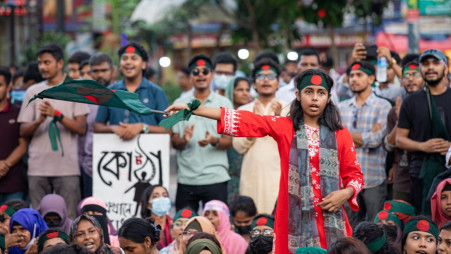Dhaka, July 16, 2024 – The quota reform movement in Bangladesh has once again gained significant traction as thousands of students and young professionals took to the streets of Dhaka, demanding a comprehensive overhaul of the country’s public service quota system. This resurgence marks a continuation of the long-standing debate over the fairness and efficacy of the quota system in government job allocations.
Protesters gathered at the iconic Shahbagh intersection, chanting slogans and holding banners that called for a merit-based system. The demonstrators argue that the current quota system, which reserves 56% of government jobs for various groups including freedom fighters’ descendants, women, and ethnic minorities, undermines meritocracy and disadvantages qualified candidates.
“We are not against quotas for marginalized communities, but the current system needs reform to ensure that it benefits those who genuinely need it while also upholding merit-based recruitment,” said Ayesha Rahman, a recent graduate from Dhaka University and one of the movement’s key organizers.
The government has responded to the protests with a mix of acknowledgment and caution. Prime Minister Sheikh Hasina addressed the nation, stating, “We recognize the concerns of our youth and are committed to reviewing the quota system to ensure it is just and equitable. However, any changes will need to balance the interests of all communities.”
This latest wave of protests is reminiscent of the 2018 quota reform movement, which saw widespread student demonstrations and led to the government’s promise of reform. However, activists claim that progress has been slow, and the promised changes have not been fully implemented.
Human rights organizations and civil society groups have expressed solidarity with the protesters, emphasizing the need for a transparent and inclusive dialogue to address the issue. “A fair and balanced approach to public sector recruitment is essential for social justice and national development,” said Farah Kabir, Country Director of ActionAid Bangladesh.
As the movement gains momentum, the eyes of the nation are on the government to see how it navigates this complex and sensitive issue. The protesters remain steadfast in their demands, vowing to continue their demonstrations until meaningful reforms are enacted.
The coming weeks will be crucial in determining the future of the quota system in Bangladesh and whether the voices of the nation’s youth will lead to substantive change in the country’s public sector employment policies.




